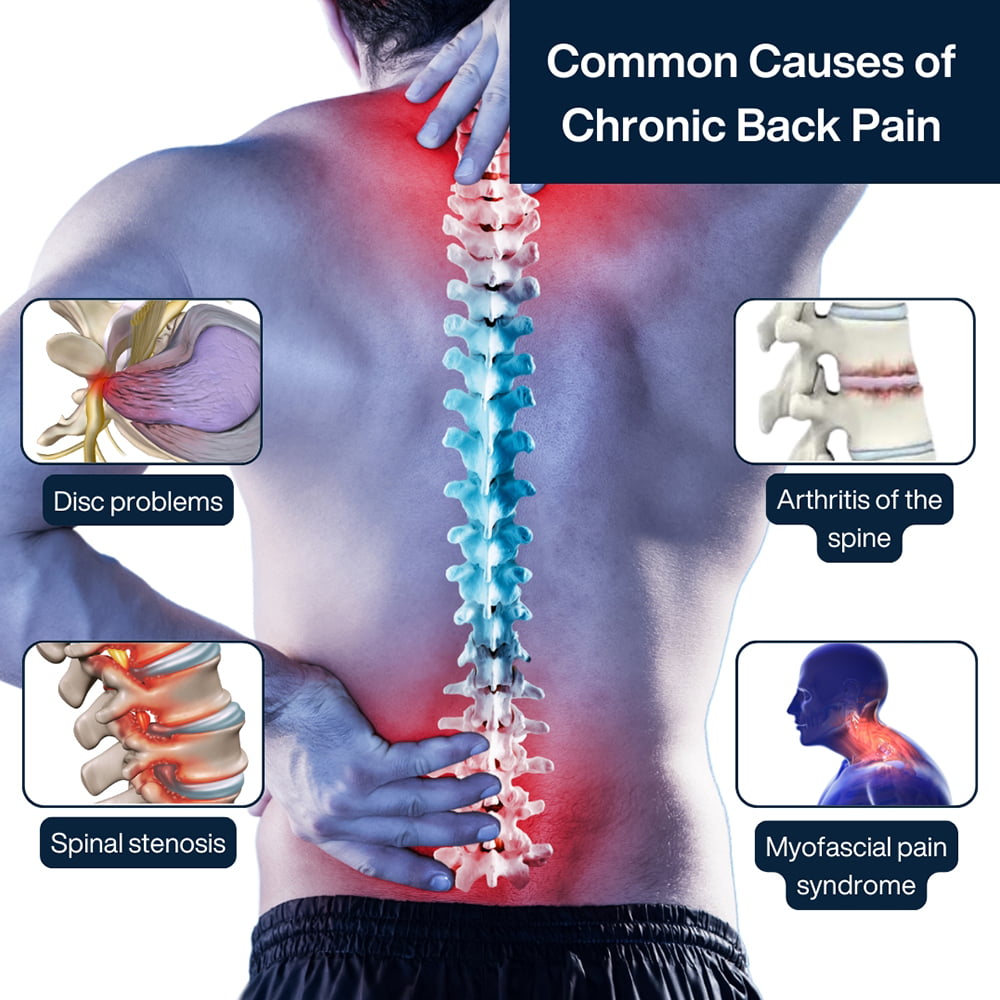Long-term back pain can get frustrating and unbearable as it begins to affect your overall health, work, and routine activities. Thanks to modern medicine and advanced technology, minimally invasive treatments can provide lasting relief from pain. Visit our expert pain doctor, Dr. Leon Reyfman for treatment options that make you feel better without going through too much pain or enduring a slow recovery process. Dr. Reyfman focuses on identifying the source of your pain. He understands that surgery may not always be the best option for curing your back pain and recommends the most suitable, advanced treatment modalities to get your life back on track.
Back pain is considered chronic when it persists for more than three months. It affects men and women equally and can have an abrupt onset or develop gradually through the years. Dealing with recurring chronic back pain episodes can be difficult, especially if you don’t know its causes.
What Is Chronic Back Pain?
Back pain can develop anywhere from the neck to the lower spine. Chronic back pain may come and go, sometimes quickly or slowly, lasts longer than 12 months, and occurs daily. This type of pain is common, and most adults experience it at least at one point in their lifetime. It is also the reason people seek medical assistance or miss work.
Back pain can range from a muscle aching to a shooting, burning, or stabbing sensation. Also, the pain can radiate down a leg and interfere with movement or make it hard to stand up straight. At times, bending, twisting, lifting, standing, or walking can worsen it, which can disturb your daily routine and overall quality of life.
Related Articles: Common Causes of Pain in the Back of the Ankles
Some Common Causes of Chronic Back Pain
Usually, chronic back pain is age-related, but it can also result from an injury. The most common causes include:
- Arthritis of the spine — the gradual thinning of the cartilage inside the spine
- Spinal stenosis — narrowing of the spinal canal that may lead to nerve pain
- Disc problems – it includes a herniated or bulging disc
- Myofascial pain syndrome — muscle pain and tenderness without a clear cause
Sometimes, it becomes difficult to pinpoint the exact cause of chronic back pain. While surgery is an option to bring relief, it involves several risks, the after-recovery process is not so smooth and takes a long time. Also, surgery does not guarantee pain relief. On the contrary, it may worsen the pain. Fortunately, there are more conservative options that can treat chronic back pain and aches successfully.
Depending on the causes and severity of your back pain, you may benefit from non-surgical back pain treatment methods. However, it is important to consult your doctor before starting them.

7 Non-surgical Treatment Options for Chronic Back Pain
Here are the top non-surgical treatment options that can help you get rid of that annoying back pain.
Physical Therapy and Home Exercise Program
Physical therapy or exercise is one of the most common non-surgical treatments for relieving chronic back pain. It is a branch of rehabilitative medicine that uses specific physical exercises and equipment to increase flexibility and improve physical function and range of motion.
Physical therapy for chronic back pain may include:
- Core strengthening
- Stretching and flexibility exercises
- Retraining posture
- Testing the limits of pain tolerance
- Aerobic exercises at a comfortable pace
Physical therapy not only aims to treat the pain but also focuses on finding and eliminating its source. A trained and experienced spine psychical therapist tailors the exercise program to your specific symptoms, condition, and comfort level. He will first determine the areas of weakness or stiffness in the body that impair the biomechanical balance of the body, and prescribe exercises to treat these problems, strengthen the targeted muscle groups, and relieve chronic pain.
Remember, maintaining the recommended exercise routine at home is essential for ensuring spine strength and stability and for keeping the pain away.
Meditation and Mindfulness
Chronic back pain can be both emotionally and physically straining. Not only this, long-term back pain causes the muscles to tense up, and when you are stressed, it can worsen the situation and lead to even more back pain. Meditation and mindfulness can provide comfort and help you deal with the stress, frustration, and other psychological aspects of dealing with pain.
Meditation is a great way to improve concentration, release feel-good hormones, and decrease anxiety and stress. With thoughtful mindfulness, you can redirect your thoughts, relieve discomfort, and improve your ability to cope with recurring pain. The right approach enables you to handle the way your body perceives pain and cope with it in a much better way.
Your trainer or guide may recommend meditation, yoga, tai chi, and other cognitive and relaxation strategies that boost conscious control over your nervous system and its response to activity.
Changes in Diet
It may come as a surprise, but what you eat or drink can affect your back pain. Some diets are very inflammatory, especially those high in trans fats, refined sugars, and processed foods, and can lead to chronic, uncomfortable pain, and not just in the back. Maintaining a healthy weight can also lessen back pain by reducing pressure on the spine.
Allergies, intolerances, and sensitives can also affect your pain levels. If you are dealing with persistent back pain, you may want to avoid the following:
- Red meat
- Highly processed foods
- Foods with added sugars
- White bread, pasta, rice, and other refined carbs
- Whole-fat dairy
- Sugary drinks and snacks
- Fried foods
At the same time, there are some foods you should include in your diet. These include:
- Fish as they are a good source of omega-3 fatty acids
- Beans, including grains, seeds, nuts, and pulses
- Eggs and chicken without skin
- Red wine – a glass a day adds healthy antioxidants to your diet
According to pain specialists, healthy eating habits are important, particularly for people living with diabetes who experience chronic pain. If they do not manage their blood sugar well, the pain worsens. Speak to your doctor for the best advice on eating a balanced diet and developing healthy eating habits to support your health goals.
Modifications in Lifestyle
If you are dealing with chronic back pain, you need to find out what you can and cannot do. You must listen to your body and learn to pace yourself. There are many ways to adapt and adjust your behavior and activity that can significantly improve chronic back pain before even considering medications or surgical procedures. Making small lifestyle changes can reduce your back pain and prevent your condition from advancing.
Take note of activities that worsen your pain and avoid them if possible while engaging more with activities you find comfortable and enjoyable. It is important to avoid strenuous activities such as mowing the lawns or carrying hefty bags of groceries. When you make these changes, you protect your back from further damage as well. Stay away from harmful habits like smoking, which is known to heighten pain and delay healing. Focus on one realistic goal you can achieve comfortably before addressing another lifestyle change for the best outcomes.
Injection-Based Treatments
Injections-based treatment can treat chronic back pain for a set period. While they may relieve the pain for a while, they are not intended as a long-term solution and should not be used in isolation. Injections are usually suggested when the source of pain is known, as they can aid in ruling out certain causes if the treatment does not work.
The goal of injection-based treatments is to improve pain and control and maximize your participation in regular, gentle activities such as physical therapy and home exercises. Your doctor will recommend injection-based procedures available for chronic back pain.
Alternative Treatments
Alternative treatments and remedies help to fight chronic pain and provide relief from persistent discomfort.
Several alternative practices have become popular over time for their health benefits. They include:
- Acupuncture – The acupuncturist uses thin needles to target pressure points on the body. It can help with several different ailments, including back pain.
- Massage – A trained masseur can work the muscles and soothe the knots and points of tension that cause pain.
- Biofeedback therapy – This treatment helps you recognize physical pain through auditory or visual cues. It is best for people with stress and anxiety and limits the chronic back pain caused by these issues.
- Electrical nerve stimulation – Electrical nerve stimulation delivers low-voltage electric currents to the back, which loosens up muscles and relieves pain.
- Laser therapy
The potential benefits of alternative treatments can make a significant difference in your condition. Consult your doctor about the alternative treatment that will work for you.
Pharmacologic Treatments
The use of pharmaceutical medications, including topical, oral, and injectable medications can relieve back pain. There is a wide range of anti-inflammatories, muscle relaxants, nerve pain medications, and even antidepressants that have proved effective for back pain.
Your doctor will recommend the most suitable medication for addressing pain after diagnosing its causes and symptoms. Follow the dosage instructions to make sure they are effective and well-tolerated. It is essential to know that medications can have unwanted side effects as well, so work with your doctor to explore options for addressing the cause of your pain.
If you want to avoid invasive treatments for chronic back pain, these methods can help you keep the frustrating back pain at bay. The pain specialist will work with you to find a combination of therapies for managing your back pain and putting it behind you all together before recommending surgery.
Remember, when you treat chronic back pain without surgery, what works for one person may not work for another. You may end up trying different methods to find out which is most effective.
Related Articles: 8 Signs It’s Time to Call a Doctor for Your Back Pain
When Is Surgery a Good Idea for Back Pain?
If you suddenly start experiencing some red flag symptoms, it is a sign your chronic back pain has taken a turn for the worse, and it may be time to discuss surgery with your doctor.
Symptoms related to your spine condition include:
- Developing or worsening bowel and bladder issues
- Groin numbness
- Weakness in the body, particularly hands and legs
- Gait and balance issues
- Evidence of increased reflexes
Surgery is an invasive, high-risk strategy for chronic back pain and is suggested after several treatments have been tried unsuccessfully. Your healthcare provider may also recommend surgery if the source of pain is confirmed with imaging or when no other treatment is working.
Are you ready to get started with non-invasive treatment for chronic back pain – Call Pain Management NYC today and schedule an appointment with Dr. Leon Reyfman, the best pain relief doctor in NYC. Dr. Reyfman specializes in treating pain-related issues, particularly back pain that does not go away easily and keeps on coming back, to ensure you stay healthy and comfortable for life.
Same-day appointments are also available in case of emergency.

Leon Reyfman, MD, is a top-rated, best-in-class interventional pain management doctor. He is a nationally recognized pain relief specialist and is among the top pain care doctors in New York City and the country. He is an award-winning expert and contributor to prominent media outlets.
Dr. Leon Reyfman has been recognized for his thoughtful, thorough, modern approach to treating chronic pain. He has been named a “top pain management doctor in New York” and one of “America’s Top Doctors™” for advanced sports injury treatments. Among other accolades, he was voted by peers as a “Castle Connolly Top Doctors™” and “New York Super Doctors™”. Dr. Leon Reyfman was a part of the medical team at the 2016 Summer Olympic Games in Rio de Janeiro, Brazil.
